July 4, 2025

The demand for Board Certified Behavior Analysts (BCBAs) is soaring, with a projected job growth of 25% for behavior analysts. This surge underscores the increasing need for skilled professionals in ABA therapy. Understanding the factors that influence ABA therapy salaries is crucial for both employers and job seekers alike.
significantly affect compensation in this field. For instance, the average salary for BCBAs stands at approximately $75,784. This data not only highlights the financial rewards of this profession but also emphasizes the importance of strategic recruitment.
Are you facing challenges in hiring qualified behavior analysts? Hire ABA can address these issues effectively, providing you with the expertise needed to navigate the competitive landscape of ABA therapy recruitment. Trust in a platform that understands the nuances of this field and is committed to connecting you with top talent.
Understanding the financial landscape of Applied Behavior Analysis (ABA) therapy is crucial for both aspiring professionals and employers in the field. With the demand for Board Certified Behavior Analysts (BCBAs) surging—driven by the increasing recognition of ABA therapy's effectiveness—salary expectations for these roles are evolving significantly.
Yet, with various factors such as education, experience, location, and employer type influencing compensation, how can one navigate this complex terrain? This article delves into the key elements that shape ABA therapy salaries, offering insights that can aid professionals in making informed career decisions and employers in attracting top talent.
Applied Behavior Analysis (ABA) therapy stands as a scientifically grounded approach, emphasizing the understanding and modification of behavior through evidence-based techniques. Particularly effective for individuals with autism spectrum disorder (ASD) and other developmental disorders, ABA therapy aims to increase positive behaviors while reducing harmful ones. This focus enhances the overall quality of life for patients. The significance of ABA therapy in healthcare is underscored by its structured interventions, leading to measurable improvements in communication, social skills, and daily living activities.
Consider this: recent studies indicate that approximately 64% of individuals diagnosed with autism utilize ABA therapy, reflecting its status as a gold standard treatment. Furthermore, research shows that between 63% and 88% of studies report positive outcomes in cognitive, language, and adaptive behavior among children receiving ABA interventions. As the demand for ABA therapy continues to rise, understanding the ABA therapy salary and its vital role becomes crucial for professionals in the field, particularly when evaluating career paths and income expectations.
The typical ABA therapy salary for an ABA therapist is around $35,938, with job growth anticipated to exceed 20% by 2029. This statistic emphasizes the growing demand for skilled professionals in this essential field of healthcare. Are you prepared to meet this demand? Explore how Hire ABA can facilitate your recruitment process, ensuring you attract the best talent in the industry.
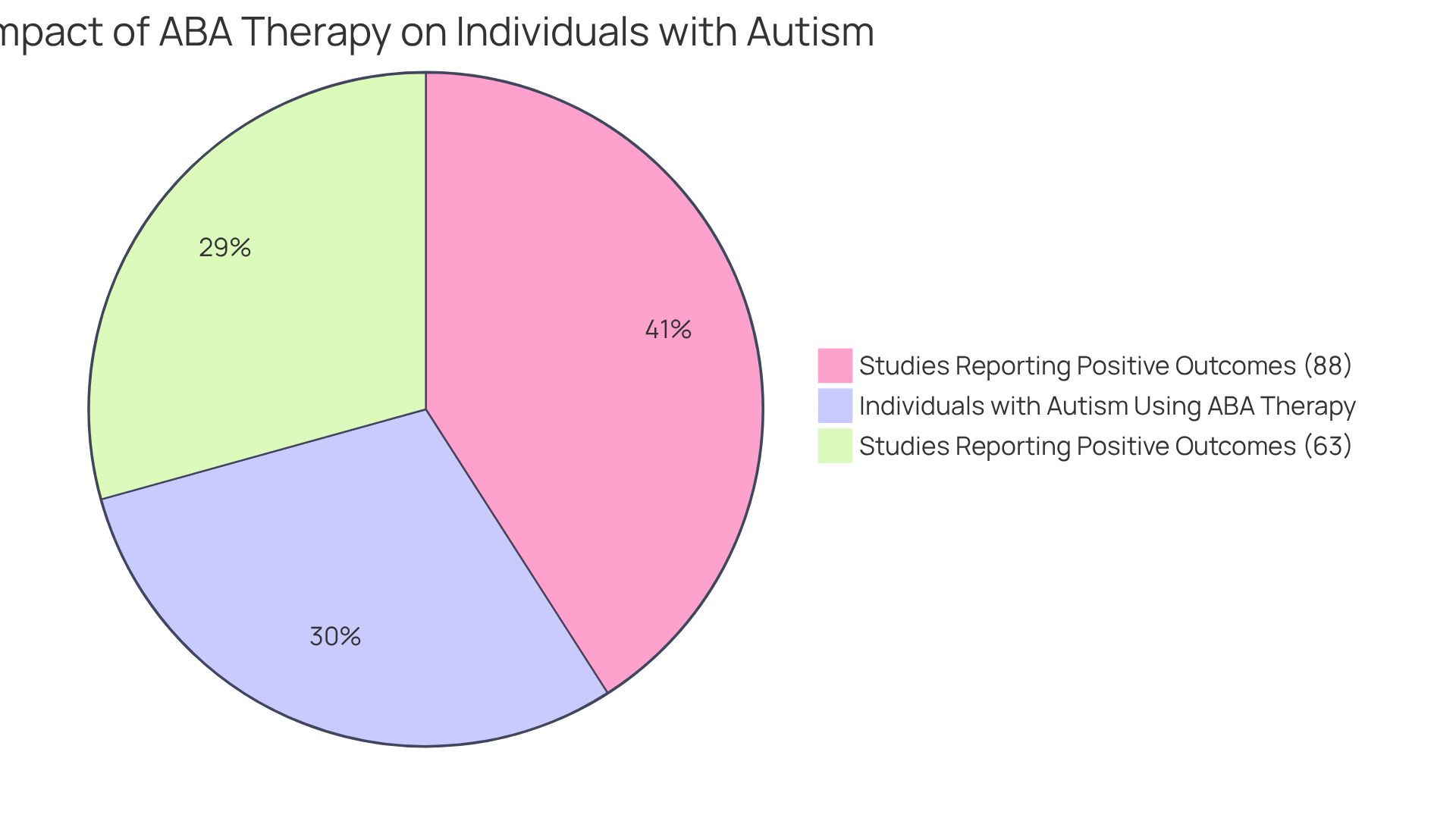
Several key factors significantly influence the ABA therapy salary in the field. The rising demand for Board Certified Behavior Analysts (BCBAs) makes it essential to understand the factors that influence ABA therapy salary in this field.
Education Level plays a crucial role. Higher degrees, such as a Master's or Doctorate in behavior analysis, typically lead to increased earning potential. For instance, the average salary of a BCBA, which can be considered an ABA therapy salary, is approximately $75,784 annually. Those with advanced degrees often command an ABA therapy salary that surpasses this national average, reflecting their specialized training and expertise.
Certification is another significant factor. Obtaining certifications like the Board Certified Behavior Analyst (BCBA) can substantially enhance earning potential, especially in terms of ABA therapy salary. Professionals with additional certifications, such as BCBA-D, earn approximately 10-15% more than those with standard BCBA credentials, demonstrating how advanced qualifications can impact ABA therapy salary.
Experience also correlates strongly with salary levels. Entry-level behavior analysts (0-2 years) earn between $60,000 and $70,000, and those with 13 or more years can earn upwards of $120,000, illustrating the range of ABA therapy salary in the profession. This highlights the financial advantages of gaining experience in the field related to ABA therapy salary.
Location is a critical consideration. Salaries for ABA therapy vary widely by state and city, influenced by local demand for ABA services and the cost of living. For instance, behavior analysts in New Jersey earn between $94,000 and $95,532, while those in Alabama earn approximately $58,657. This illustrates the significant geographic disparities in ABA therapy salary compensation.
Finally, the Type of Employer impacts compensation levels. The environment in which a BCBA operates also impacts their ABA therapy salary. Positions in private practices often offer a higher ABA therapy salary compared to those in schools or healthcare facilities. Independent practitioners frequently charge rates approaching $100 per hour, thus maximizing their income potential.
Understanding these elements can assist BCBAs and employers in navigating the compensation landscape efficiently. It is crucial to ensure that remuneration corresponds with qualifications and market needs. Are you facing challenges in hiring qualified BCBAs? Consider utilizing Hire ABA for your recruitment needs.
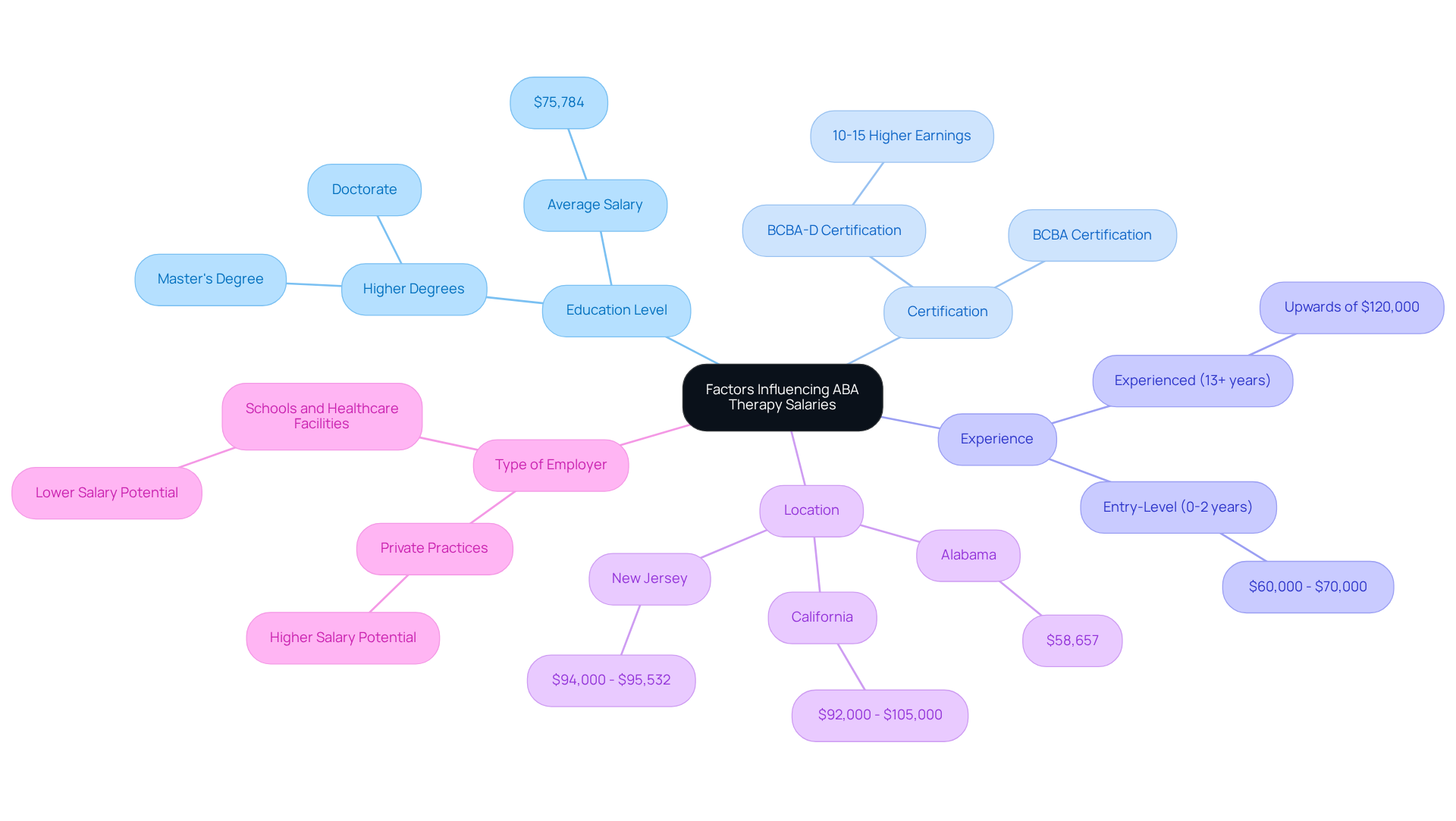
The demand for Board Certified Behavior Analysts (BCBAs) is projected to increase by 25% by 2026, underscoring the competitive landscape for ABA professionals. The variation in ABA therapy salary across the United States is considerable, influenced by factors such as demand, cost of living, and local healthcare systems.
Furthermore, the typical ABA therapy salary for Board Certified Behavior Analysts is reported to be $69,788, whereas Board Certified Assistant Behavior Analysts earn an average of $54,274. Grasping these regional salary variations, such as ABA therapy salary, is vital for experts in the area, allowing them to make knowledgeable choices and successfully negotiate their pay.
With the demand for BCBAs projected to rise significantly, the landscape for ABA professionals is expected to become even more competitive. Are you prepared to navigate these challenges? Consider utilizing Hire ABA to streamline your recruitment process and secure the best talent in this evolving market.
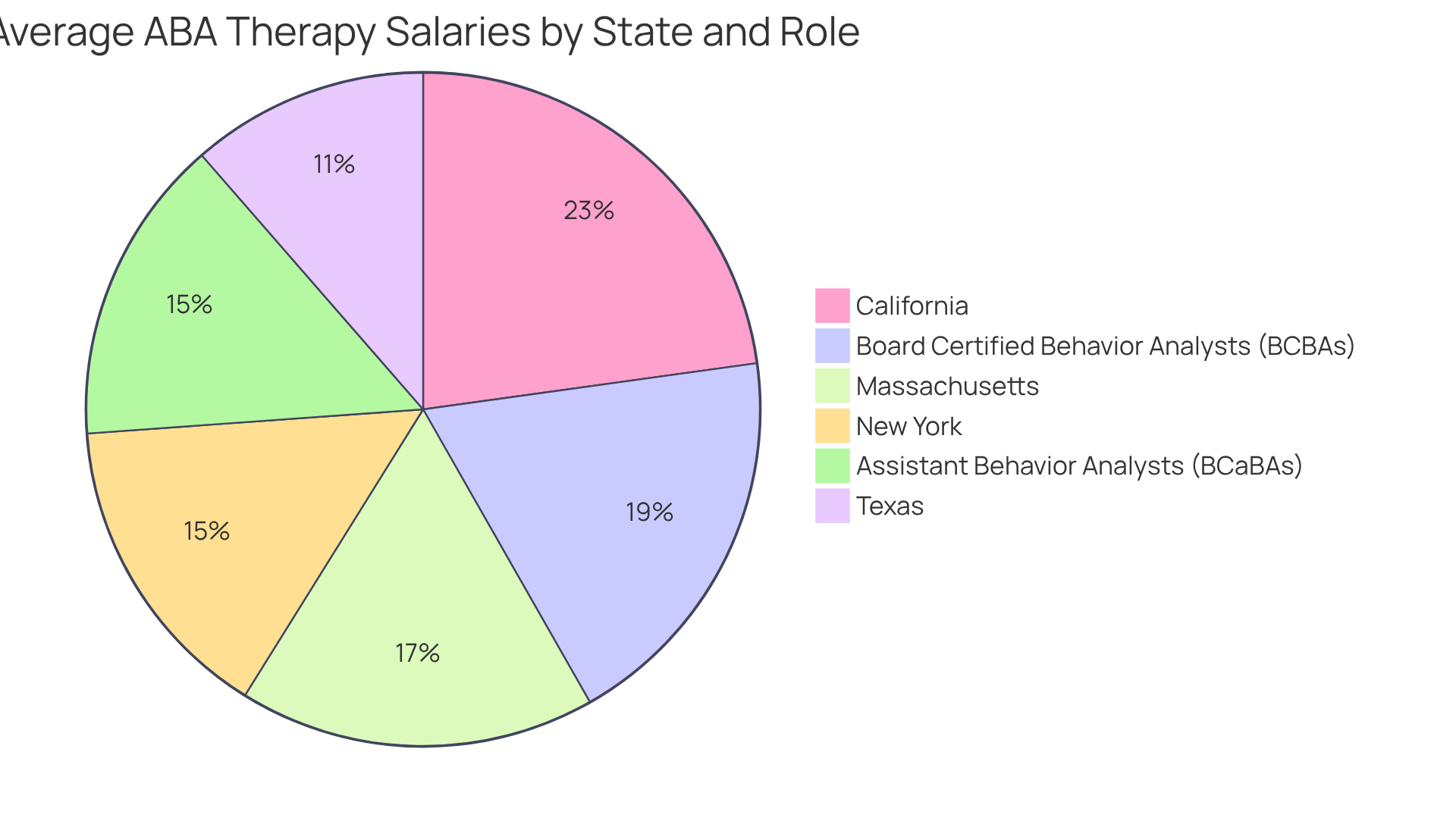
The demand for Board Certified Behavior Analysts (BCBAs) is surging, with the number of certified professionals skyrocketing from approximately 5,000 in 2013 to 48,000 in 2022. This remarkable growth reflects an urgent need for qualified individuals in the field of Applied Behavior Analysis (ABA). To embark on this promising career, aspiring BCBAs typically follow a structured pathway that includes several key steps.
Certification is not just a formality; it confirms the expertise of behavior analysts and significantly enhances their employability, ultimately affecting their ABA therapy salary in a rapidly expanding field. The projected job growth rate for board-certified behavior analysts is an impressive 25% by 2026, highlighting the importance of pursuing certification in this thriving market, where the ABA therapy salary is also very competitive.
While the journey to certification is rewarding, aspiring behavior analysts may face challenges, including the complexities of the certification process and financial obstacles associated with obtaining a master's degree, which can cost around $40,000. However, success stories abound. For instance, Sarah transitioned from a starting salary of $65,000 to over $86,000 in just four years by specializing in organizational behavior management. This trajectory illustrates the potential for financial growth and career advancement within the ABA profession, particularly in relation to ABA therapy salary.
Moreover, Board Certified Behavior Analysts have diverse career paths available, including roles in administrative positions, private practice, and consulting, further enhancing their professional opportunities.
To support aspiring BCBAs, Hire ABA offers personalized resume assessments that evaluate candidates' experiences and career goals. By utilizing advanced job fit scoring, Hire ABA ensures that candidates are matched with the best roles suited to their skills, preferences, and desired locations. This extensive support not only assists in navigating the certification process but also significantly improves job placement success rates and candidate satisfaction in the ABA therapy sector.
Overall, the BCBA certification process is a vital step for those aspiring to make a meaningful impact in the field of Applied Behavior Analysis. Are you ready to take the next step in your career? Let Hire ABA guide you toward success.
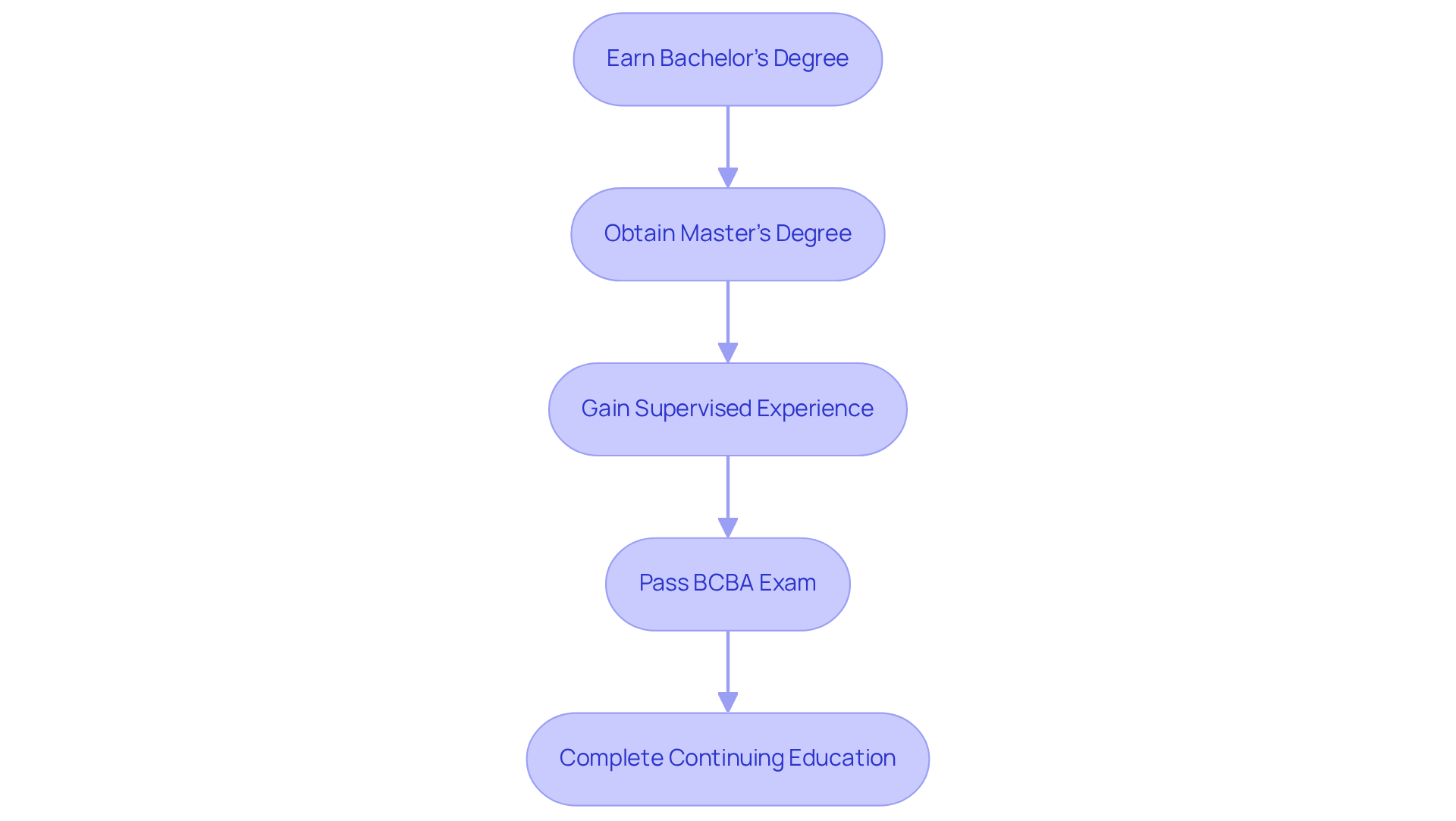
The career outlook for Board Certified Behavior Analysts (BCBAs) is exceptionally promising, with a projected job growth rate of approximately 25% by 2026 and around 22% over the next decade. This significant demand raises an important question: Are you prepared to meet the hiring challenges in this booming field?
Several key factors drive this growth:
As the demand for qualified behavior analysts continues to rise, professionals in this field can anticipate a stable and rewarding career path. Job listings for behavior analysts rose by 14% from 2022 to 2023, with the total number of job postings surpassing 65,000. This trend reflects a market that exceeds the supply of certified professionals, underscoring the essential role BCBAs play in enhancing service delivery across healthcare and educational sectors.
Furthermore, the average yearly salary for certified behavior analysts, also known as ABA therapy salary, in schools and educational institutions can reach up to $110,000, highlighting the financial prospects in this field. With the ABA therapy market booming, staying informed about new opportunities can further enhance career advancement for BCBAs. This allows them to explore leadership roles and flexible working conditions that let them influence more lives while advancing their careers.
In light of this information, consider how Hire ABA can assist you in navigating the hiring landscape and securing the best talent in this vital field.
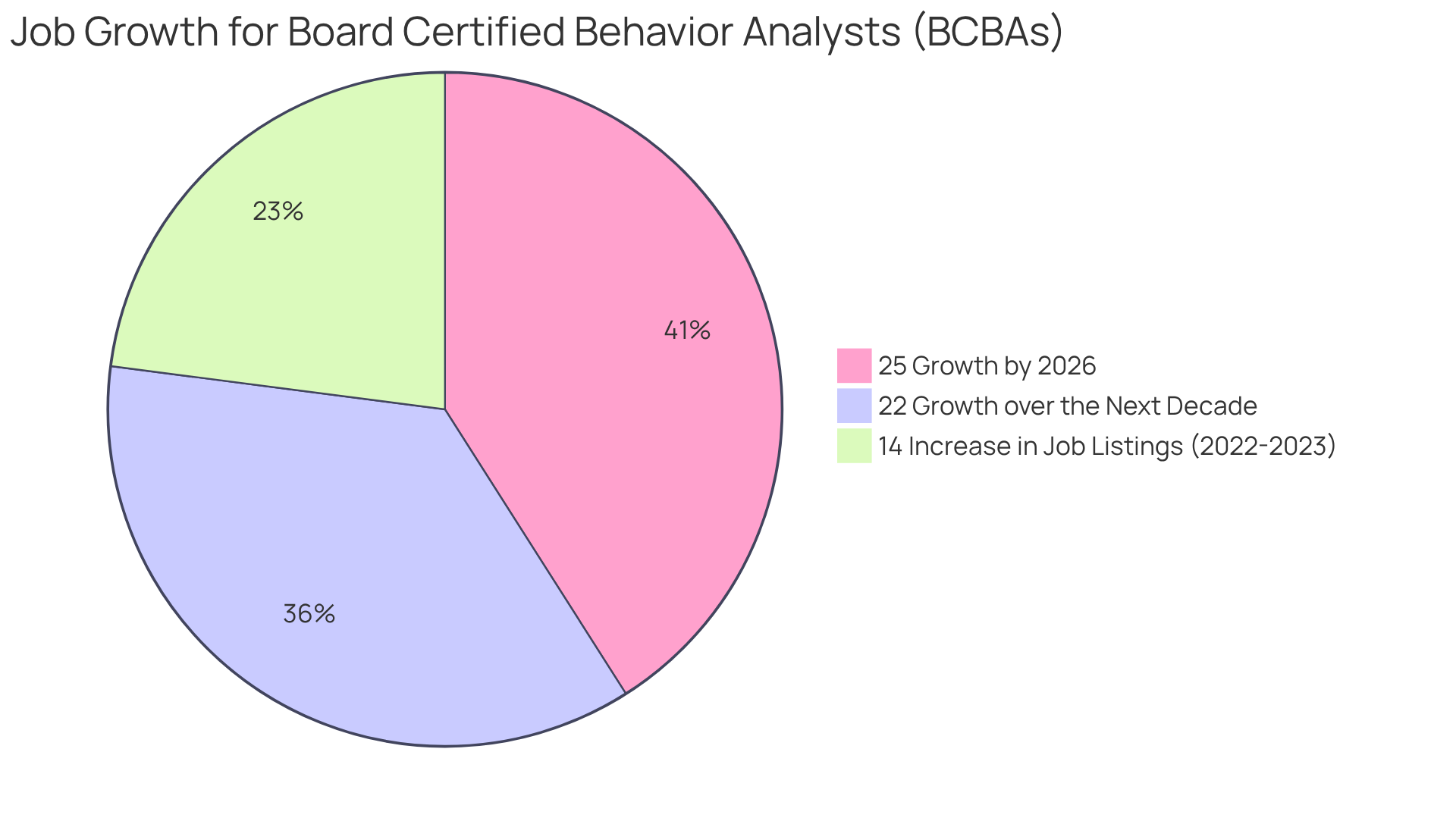
The exploration of ABA therapy salaries unveils a critical intersection of demand, qualifications, and regional variations that shape the financial landscape for professionals in this field. Did you know that the demand for Board Certified Behavior Analysts (BCBAs) is on the rise? Understanding these dynamics is essential for both aspiring behavior analysts and employers seeking to attract top talent. As the field of Applied Behavior Analysis continues to grow, recognizing the factors that influence earning potential—including education, certification, experience, location, and the type of employer—becomes increasingly important.
Key insights from the article reveal that advanced degrees and certifications can significantly enhance salary prospects. Geographic disparities further underscore the necessity for professionals to be informed about the market conditions in their specific areas. The projected job growth for Board Certified Behavior Analysts indicates a vibrant and expanding career path, making this an opportune time for individuals to enter the field.
In light of these insights, it is imperative for both job seekers and employers to remain proactive in navigating the evolving landscape of ABA therapy. Are you facing challenges in hiring qualified behavior analysts? By leveraging resources like Hire ABA, professionals can better position themselves for success, ensuring they meet the increasing demand for qualified behavior analysts and optimize their career trajectories. The future of ABA therapy not only promises rewarding financial opportunities but also the chance to make a meaningful impact on the lives of individuals with developmental challenges.
What is ABA therapy and why is it important in healthcare?
Applied Behavior Analysis (ABA) therapy is a scientifically grounded approach that focuses on understanding and modifying behavior through evidence-based techniques. It is particularly effective for individuals with autism spectrum disorder (ASD) and other developmental disorders, aiming to increase positive behaviors while reducing harmful ones. ABA therapy enhances the overall quality of life for patients and is recognized as a gold standard treatment, with a significant percentage of individuals diagnosed with autism utilizing it.
What are the typical salary expectations for ABA therapists?
The typical salary for an ABA therapist is around $35,938. However, the average salary for a Board Certified Behavior Analyst (BCBA) is approximately $75,784 annually, with job growth anticipated to exceed 20% by 2029.
What factors influence ABA therapy salaries?
Several key factors influence ABA therapy salaries, including education level, certification, experience, location, and type of employer. Higher degrees and certifications can lead to increased earning potential, while experience significantly correlates with salary levels. Geographic location also plays a critical role, with salaries varying widely by state and city.
How does education level affect ABA therapy salaries?
Education level is crucial, as higher degrees, such as a Master's or Doctorate in behavior analysis, typically result in increased earning potential. Professionals with advanced degrees often earn salaries that surpass the national average for ABA therapy.
What role does certification play in ABA therapy salaries?
Obtaining certifications, such as the Board Certified Behavior Analyst (BCBA), can significantly enhance earning potential. Professionals with advanced certifications, like BCBA-D, earn approximately 10-15% more than those with standard BCBA credentials.
How does experience impact ABA therapy salaries?
Experience strongly correlates with salary levels in ABA therapy. Entry-level behavior analysts (0-2 years) earn between $60,000 and $70,000, while those with 13 or more years of experience can earn upwards of $120,000.
How does location affect ABA therapy salaries?
Salaries for ABA therapy vary widely by state and city, influenced by local demand for ABA services and the cost of living. For example, behavior analysts in New Jersey earn between $94,000 and $95,532, while those in Alabama earn approximately $58,657.
Does the type of employer influence ABA therapy salaries?
Yes, the type of employer impacts compensation levels. Positions in private practices often offer higher salaries compared to those in schools or healthcare facilities. Independent practitioners can charge rates approaching $100 per hour, maximizing their income potential.
Our expert recruitment strategies and AI-driven sourcing ensure that you receive top-notch candidates quickly, without compromising on quality. Whether you’re looking for BCBAs, Clinical Directors, or RBTs, we’ve got you covered.